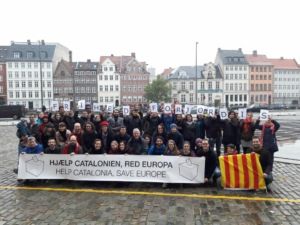Opinion
Danish Capital in 2017: Catalysts compounding the crisis in Catalonia
Neil Smith
This article is more than 8 years old.

Fortunately the region’s Scrabble team were present to lend a hand (photo: Pixabay)
Until last month, Spain was back in business after years in the economic doldrums. A constitutional crisis in Catalonia, one of its wealthiest and most populous regions, has changed everything.
On top of mass demos and politicians detained in jail, it has had an economic impact. Around 1,500 companies have moved their headquarters. Caixa, one of Spain’s largest banks, says this was unavoidable to head off political risk. Meanwhile, Spain’s GDP forecasts were reduced, and the issue has reignited concerns about the Spanish economy.
PM’s intransigence
Catalonia’s unilateral declaration of independence self-evidently lacked not only legal but moral authority, given that there is no clear evidence it is backed by a majority of Catalans. It came as little surprise that the declaration received limited support from the international community. A serious analysis of the situation must, though, accept that the secessionists were forced to take ever more drastic steps by the intransigence of Spanish PM Mariano Rajoy and his ruling People’s Party (PP).
Although there is no clear majority for independence, most Catalans want constitutional change. Yet PP has been obstructionist for a decade, torpedoing, with an assist from the Constitutional Court’s controversial decision, large sections of the 2006 constitutional settlement, which would have given Catalonia greater rights within Spain.
Reckless refusal
Thereafter, Rajoy could have tried to work with the many moderate Catalans. Instead, he doubled down, scorning the independence movement as a conspiracy. His reckless refusal to negotiate with secessionists was popular outside of Catalonia, as Rajoy sought popularity on a Spanish unity ticket (ironically, the very thing his tactics threatened in the long run).
Rajoy’s move backfired, leading to a whole new line of argument for an independent Catalonia Boxed into a corner, the secessionist leaders were forced into more serious acts of brinksmanship. The recent flawed (and largely meaningless) declaration of independence was in many ways the foreseeable conclusion.
Divided and discontented
Next month’s election is unlikely to lead to a magical breakthrough, and discontent may bubble for years.
Rajoy’s intransigence has moved matters into dangerous territory; whilst some wavering Catalans may decide independence is not worth the trouble, others will only have their position reinforced. And a divided society is dangerous for Spain – politically, culturally and economically.

About
Neil Smith
Neil is a Scottish-educated lawyer with 15 years’ experience in corporate structuring and general commercial matters. Based in Copenhagen, he primarily advises on international deals. Out of the office his interests include sport and politics. His column explores topical international financial and economic issues from a Danish perspective.










































